Helping trans people escape death in their home countries
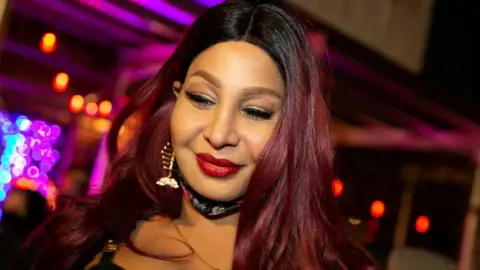 Erica Lansner photography
Erica Lansner photography"I feel like they need a mother, they need hope."
Iman Le Caire is smiling as she runs through the list of names of the transgender people she has helped to flee from persecution during the coronavirus pandemic.
The first was Ritaj, a young trans woman in Yemen who was "mentally and physically broken" after being sentenced to 100 lashes on homosexuality charges and imprisoned.
According to Yemeni law, if Ritaj had been married at the time and found guilty of homosexual acts, she could have been stoned to death.
As a fellow trans woman, who had escaped her own terrible situation in Egypt, Iman says she could no longer stand by while this suffering went on behind closed doors.
"I had been there, I endured the same pain. Our families spit on us with the same spit," says Iman.
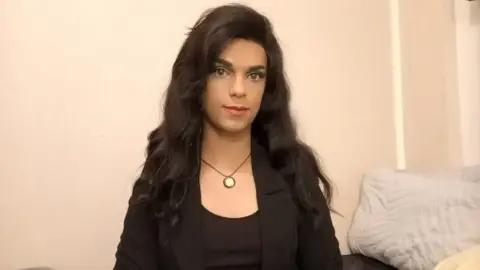 Ahmed Al Ahdal
Ahmed Al AhdalFor months, Ritaj and Iman spoke on the phone as they prepared the paperwork for Ritaj to flee. They also started a GoFundMe page to raise her legal fees, with the help of Aliyah, another trans woman activist.
Ritaj knew she had, in Iman's words, to "butch it up" and appear masculine so that no-one would question her during the first leg of her daring escape, a 36-hour drive and a flight to Cairo.
From there, an immigration lawyer flew out to help make her case to the French consulate, which meant she could be flown on a humanitarian visa to France, where she started a new life.
"A lot of LGBT people in Arab countries are currently in prison without anybody to help them," Ritaj says.
"Many are abandoned by their families, can't find work and become homeless just because they are LGBT. Governments need to put laws in place to protect them."
Isolated with a hostile family
There are still many countries where being transgender - where a person's gender identity is different from the sex they were registered as at birth - is heavily stigmatised.
Amnesty International warned that the climate had become particularly bad during the pandemic, with many trans people "isolated with hostile family members" and unable to access healthcare or wider support.
"The crisis has always been bad, but the pandemic has made it worse. There are crimes committed against transgender people," Iman explains. "How can you live in a country when your family and government don't want you there?"
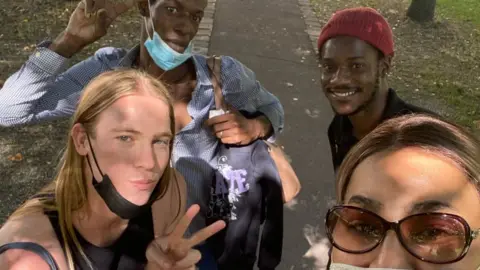 Iman Le Caire
Iman Le CaireIt's a feeling she knows all too well. Growing up as a boy in a rural Egyptian village, Iman always knew inside that she was a woman. She says she was abused for behaving in a feminine way, accused of having a "female demon" inside of her.
She describes her childhood as brutal and unforgiving. From the age of eight she was raped for two years by someone close to the family, she says, an open secret that led to further sexual assaults at the hands of others.
The perceived shame and dishonour attached to the family was so great, she says, that it culminated in her being stabbed in the chest before her sister intervened and rushed her to hospital.
When she later transitioned, it was her sister's name - Iman - that she chose out of gratitude for saving her life.
Dancing became a way to combat her anxiety, and a job performing at the Cairo Opera house initially looked like a chance to start over.
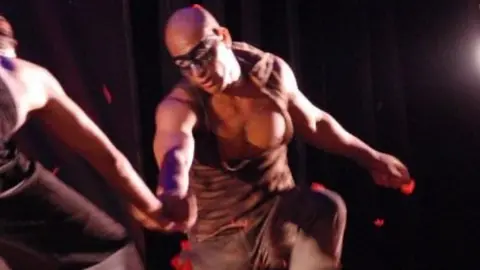 Iman Le Caire
Iman Le CaireWhile unable to acknowledge that she was transgender, Iman had a boyfriend and says that as a high-profile LGBTQ person she was targeted relentlessly by the police on trumped-up charges.
Scared for her life, she left on a tourist visa for New York, where she applied for asylum.
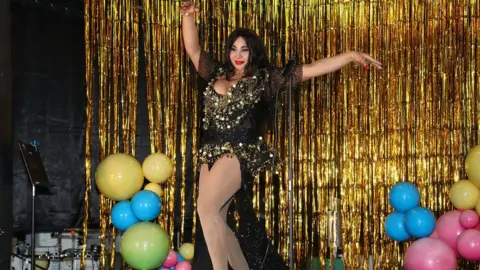 Jeff Eason
Jeff EasonAlone in a new city, she spiralled into depression and started using drugs before meeting her future husband Jean-Manuel and physically transitioning to become a woman in her 30s.
Political awakening
After going through so much, Iman resolved to keep a low profile and concentrate on her job as a performance artist.
But a political awakening came through the death of George Floyd in May 2020 and the Black Lives Matter protests. Iman says the "toxic masculinity" that fuelled the problems reminded her of the way she had been treated back in Egypt.
"And then suddenly the pandemic happened. I was so scared. I went out to protest and I found my healing, they were fighting for black lives and for trans lives."
 Madison Swart
Madison SwartA few weeks later, Iman was further mobilised by the suicide of Sarah Hegazy, a 30-year-old lesbian, who had been imprisoned for flying a rainbow flag at a concert as part of Egypt's ruthless crackdown on LGBT rights.
Sarah Hegazy was living in Canada after being granted asylum, but had been experiencing post traumatic stress and depression after being tortured in jail, according to reports from Amnesty International.
"She couldn't take it. And I related to her, having been in prison in Egypt I know what they do to people," Iman says.

Trans lives in the Arab world
By Nada Menzalji - Women's Affairs Reporter, BBC Arabic
In the Middle East, LGBTQ+ people are often stigmatised and subjected to harassment and violence based on their sexuality and gender identity, often at the hands of their own family.
For trans people, life can be particularly dangerous. Being trans is often considered "immoral", and transgender people are often regarded as "criminals" or "blasphemers".
According to a 2020 Human Rights Watch report, transgender women in the region are often perceived as gay men, and are targeted for the same reasons and prosecuted under the same broad accusations of "having carnal relations against the order of nature" or "imitating women". Punishment for gay sex ranges from imprisonment in countries like Syria, to the death penalty in some cases in Yemen and Saudi Arabia.
Transitioning can also prove challenging for transgender people. In most Arab countries, approval from a committee made up of doctors and clerics must be obtained, but surgery is only considered to correct a birth defect in someone's reproductive organs.
Some choose to transition secretly, endangering their lives by having surgery in unlicensed clinics that do not meet medical standards. But even after transitioning, getting ID that reflects a trans man or woman's appropriate name and gender will prove impossible in most of the Arab world.

Take it to the streets
During the Black Lives Matter demonstrations Iman went to protest at the Brooklyn Liberation March, which saw 15,000 people gather in front of Brooklyn Museum to demand safety for black transgender people.
Pictures of her at the march led to Ritaj contacting her and becoming her first case. Since then, there have been many others, mainly from the Middle East but also from other at-risk countries, such as Jamaica.
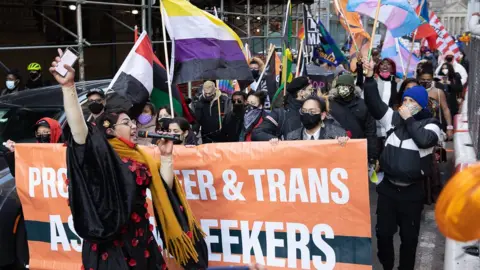 Erica Lansner
Erica LansnerIman ended up joining an organisation called TransEmigrate, which provide logistical support for those trying to move to safer countries, before founding a sister organisation, Trans Asylias, which helps persecuted transgender people apply for asylum.
She gives advice, helps check through their applications, keeps their spirits up with regular video calls and raises money for their relocation.
Sadly, Iman says, for every trans or non-binary person who has been able to leave their country, many more are still living in fear of persecution and death.
Her ultimate dream is to build a community "with nice houses and green space and doctors, where all the trans and [gender] non-conforming people who have faced all these horrible things will get treatment and get better, like when people took care of me".


BBC 100 Women names 100 influential and inspirational women around the world every year. Follow BBC 100 Women on Instagram, Facebook and Twitter. Join the conversation using #BBC100Women.
